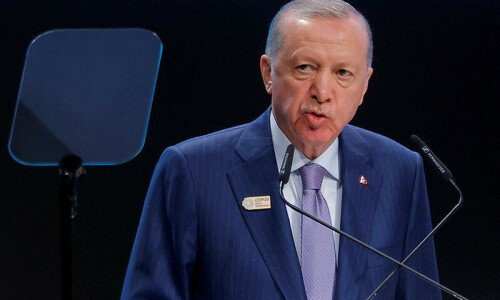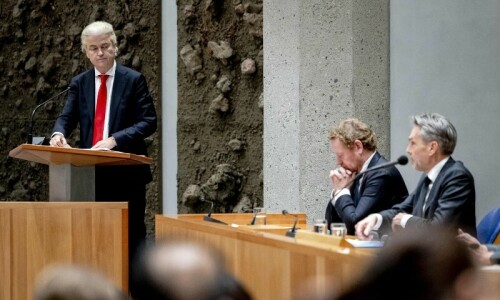THE seventh National Finance Commission (NFC) Award which became effective on July 1, 2010 managed to break the long-standing deadlock over distribution of national revenues among the provinces.
The impasse had constrained the NFCs constituted in 2001 and 2006 from announcing the awards. The seventh NFC Award included a 10pc reduction in the federal government’s share and the introduction of multiple indicator criteria (MIC) for distribution of the divisible pool among the provinces. The MIC replaced the earlier criterion that relied solely on population to determine provincial share.
The federal government’s reduced share enabled the NFC to recommend transfer of larger funds to all the provinces. Even Punjab, which in the past had shown preference for retention of the population share criterion, did not lose out in terms of the absolute amount received despite the reduction in percentage share under the new formula.
The resolution of the impasse earned much appreciation. However, the unanimity (consensus) rule that the commission follows in making decisions still keeps its proceedings deadlock-prone. Whenever the eighth NFC debates distribution, if province X demands, say, 75pc weightage to population instead of the prescribed 82pc, we will have a logjam for sure.
Is an alternate institutional arrangement possible that may prevent deadlock and keep distribution fair without disturbing national harmony? Replacing the unanimity rule with majority rule to make decisions is not possible as provinces A, B and C together may subject D to the tyranny of the majority. An alternative is an independent body of technocrats being used in countries like India, South Africa and Australia.
A two-tier structure could be the answer to the current impasse-prone NFC.
Both the intergovernmental forum, like the one in Pakistan, and an independent body of experts have their pros and cons. With regional representatives on board, the intergovernmental forum protects regional interests but gets bogged down if it follows the unanimity rule. An independent authority, comprising experts, can bring the required rigour to the revenue-sharing exercise but may not be sensitive to political realities.
An ideal mechanism would combine the merits of both, and allow for the political economy of resource distribution without letting any constituent unit exercise hegemony. A two-tier institutional structure comprising an independent body of experts and an intergovernmental forum is proposed.
A permanent independent authority of fiscal experts, practitioners and academics, would constitute the lower tier of the two-tier structure. Experts, full-time employees of the authority, would be hired without regard to provincial affiliations. The body would recommend: sharing of the divisible pool; sharing of tax bases between federal and provincial governments; suggest whether a tax base should belong to the federal or provincial government. To make recommendations, it would access available research and if required commission research as well.
Ideally, such an authority should commence its task two years before an award is due, have 18 months to conduct research, deliberate on possible options, and make recommendations along with justifications to the upper tier, the intergovernmental forum, six months before the award is due. These recommendations would be made public to encourage debate. The authority will not be required to give unanimous recommendations. Instead, dissenting members’ notes would form part of the authority’s report.
The upper tier, the intergovernmental forum comprising only the federal and provincial ministers of finance, while paying due regard to political factors and public debate on the authority’s report may or may not accept the recommendations.
If the forum decides not to accept some or all of these, members would have to individually justify their decision. The forum’s recommendations would then be conveyed to the government for final approval and announcement of the award.
The proposed structure would be an improvement on the existing one for the following reasons. The experts, placed in the position of ‘judge’ are less likely to take an unjustifiable stance. As the authority’s paid employees, they are more likely to play their assigned role rather than favour a particular constituent unit. Reliance on research will enable the members, and possibility of public debate will induce them to give sound recommendations. The latter would not be easily brushed aside by the intergovernmental forum (the upper tier) because; these would have the backing of eminent experts, would have been debated publicly and individual members of the forum would have to justify their stance if they decide not to accept the recommendations.
Setting up the proposed authority will be a challenging task — vested interests would vie for positions. The best available course would be to advertise and devise a transparent recruitment mechanism open to public scrutiny.
The writer heads the School of Public Policy at the Pakistan Institute of Development Economics.
Published in Dawn January 8th , 2014
On a mobile phone? Get the Dawn Mobile App: Apple Store | Google Play










































